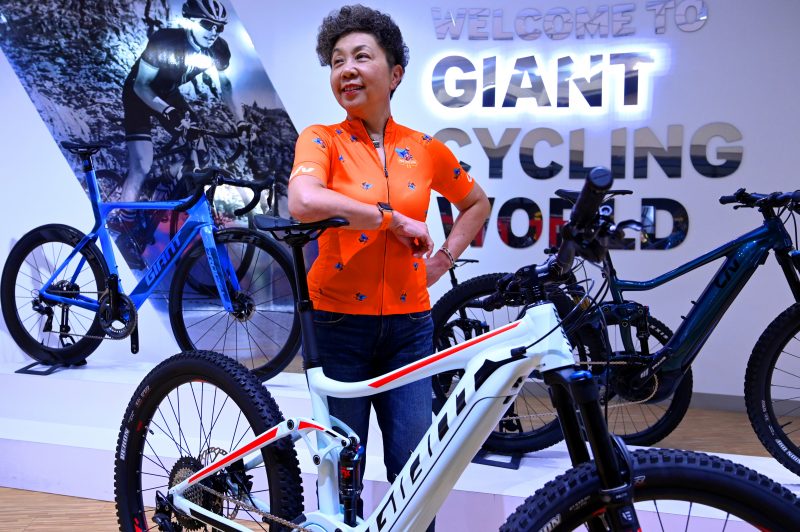Taiwan bike makers peddling home as trade war rumbles along
Giant’s Bonnie Tu says electronic bikes now make up a fifth of the company’s global revenue (Sam YEH)
Taichung (Taiwan) (AFP) – Set to a rhythmic soundtrack of clacking machinery, whirring drills and inflating tyres, bikes take shape at a factory run by Taiwan’s Giant, which is leading the island’s push to regain its crown as bike maker to the world.
And key to this push is demand for electronic two-wheelers from environmentally conscious European consumers, with surging exports providing support during the China-US trade war.
At an assembly line near the central city of Taichung, workers for Giant — the world’s biggest bike maker — build new electronic bikes that boast visibly thicker frames to house rechargeable batteries.
“This is one of the biggest driving forces for the past five years,” explained Giant chairwoman Bonnie Tu, who said e-bikes now make up a fifth of the company’s group revenue.
“But I think for this year, maybe we’ll be able to reach about 30 percent,” she added.
The global e-bike market was valued at $16.34 billion in 2017 but is expected to reach $23.83 billion by 2025, according to Allied Market Research.
Taiwan’s exports of e-bikes jumped more than 50 percent in 2018 with each unit costing more than $1,300 on average, much more than standard bicycles, according to customs data.
Taiwan had for years been the world’s number-one bike producer until the 1990s, when China’s economic reforms saw firms take advantage of a vast, cheap labour force that absorbed virtually all output of the island’s bikes.
And while Chinese factories continue to play a dominant role, Taiwan production is bouncing back. In the first quarter of 2019, e-bike exports from the island to Europe increased 135 percent on-year while shipments to the US climbed 78 percent.
– No more special treatment –
There are other increasingly compelling economic reasons to shift manufacturing away from China.
In January the EU introduced a series of anti-dumping measures after years of complaints that Chinese-made e-bikes were saturating the market, sold for below production costs thanks to state subsidies.
Then there are the punitive US tariffs imposed as part of the trade war, which has battered many Taiwanese companies that assemble on the mainland.
That has led to an even more pronounced surge in exports from Taiwan factories with firms across a range of industries increasingly willing to return home or look elsewhere for new factories.
“The shift was already kind of underway before Trump was elected, or people were talking about it anyway,” explained Shelley Rigger, an expert on Taiwan at Davidson College in North Carolina.
Even before the trade war, she said, Taiwanese companies were worried about increased labour costs in China and the fact many of the incentives used to lure them had dried up.
“They’re not getting special treatment as much and the cost benefit, they can find lower costs elsewhere. It’s been more sort of a diversification rather than a relocation,” she told AFP.
The trade war has only added to concerns, with Taiwan among Asia’s most vulnerable economies given China and Hong Kong account for 40 percent of its exports.
The island’s bike industry is seen as a useful gauge of its economic trends because the major manufacturers so closely mimic its astonishing economic rise in the past few decades.
– ‘Very important market’ –
Like Taiwan itself, the bike manufacturers began at the bottom of the global supply chain, churning out low-quality parts and products.
But as skills and knowledge improved, they became some of the world’s best-known brands with Giant — known as Trek in the US — and Merida becoming global leaders.
President Tsai Ing-wen hails from a political bloc that is deeply sceptical of Beijing and favours being much less economically reliant on it, urging firms to return to the island and leading Beijing to cut ties with the government.
Some have heeded her call.
As of April, some 40 companies, including Giant, have committed to investing a combined $6.7 billion and creating 21,200 jobs.
But the topic of relocation remains hugely controversial, with business owners fearful of being punished by China and many asking Taipei not to reveal their names or details.
Still, Tu is adamant that Giant is committed to manufacturing in China, which remains “a very important market”.
She portrays the recent opening of new assembly lines in Taiwan — and a factory in Hungary — as part of a need to be closer to consumers, saying “we are a global company”.
But she agreed the trade war had morphed from initial “jitters” to “a new reality”.
“I think I suddenly realised maybe it won’t go away,” she said. “I think the war is here. And we have got to have a long-term plan.”
Disclaimer: Validity of the above story is for 7 Days from original date of publishing. Source: AFP.


